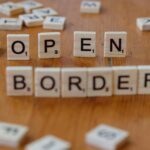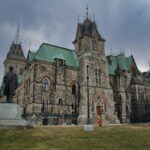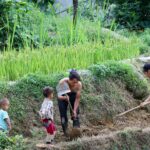Table of Contents
- A Monumental Shift: Correcting Decades of Injustice for ‘Lost Canadians’
- Decoding the New Citizenship Act: What Has Changed for Canadian Citizenship by Descent?
- Who is Eligible? A Detailed Guide to the New Citizenship by Descent Rules
- Securing Your Status: How to Apply for Proof of Canadian Citizenship
- Frequently Asked Questions
In a profound legislative move, the Canadian government has enacted a new law that fundamentally reshapes the rules for citizenship by descent, bringing long-awaited justice to individuals known as ‘Lost Canadians.’ This landmark legislation, which received Royal Assent on June 19, 2024, amends the Citizenship Act to extend citizenship to many who were previously denied their birthright due to restrictive and often complex legal provisions. The changes primarily address the controversial ‘first-generation limit’ (FGL), a rule that has separated families and left many with deep Canadian roots on the outside looking in. For countless individuals across the globe, this new law represents more than a legal amendment; it’s a restoration of identity and a reaffirmation of their connection to Canada.
A Monumental Shift: Correcting Decades of Injustice for ‘Lost Canadians’
The term ‘Lost Canadians’ refers to a diverse group of people who, despite a clear connection to Canada through parentage, were unable to claim citizenship because of outdated or discriminatory provisions in various iterations of the country’s citizenship laws. The issue was significantly exacerbated by major legislative changes in 1977 and, more recently, in 2009. The 2009 amendment introduced the stringent ‘first-generation limit’ (FGL). This rule stipulated that a Canadian citizen parent who was also born outside of Canada could not automatically pass on their citizenship to their own child born abroad. This created a situation where the second generation born abroad was effectively cut off from Canadian citizenship, regardless of their family’s heritage, culture, or enduring ties to the country.
This policy faced significant criticism for being arbitrary and unfair, leading to numerous legal challenges. A pivotal moment came with the Ontario Superior Court of Justice’s ruling in the case of Bjorkquist et al. v. Attorney General of Canada. In December 2023, the court declared the first-generation limit unconstitutional, finding that it violated the Charter of Rights and Freedoms by creating a discriminatory two-tier system of citizenship. This judicial rebuke served as a powerful catalyst, compelling the government to take legislative action. The court’s decision highlighted the profound impact of the FGL, which denied individuals the right to enter, remain in, and leave Canada—a fundamental right of citizenship. The new law is a direct response to this ruling, aiming to rectify the injustices perpetuated by the FGL and provide a clear, fair pathway to citizenship for those affected.
Decoding the New Citizenship Act: What Has Changed for Canadian Citizenship by Descent?
The new legislation, originating as Bill S-245, introduces two critical changes to the Citizenship Act. First, it retroactively grants citizenship to anyone born abroad to a Canadian parent who was also born abroad, effectively eliminating the FGL for everyone born before the law’s enactment. This is a crucial provision that automatically confers citizenship status on a large cohort of ‘Lost Canadians’ and their descendants. It corrects the historical inequity for families who have maintained a strong connection to Canada but were legally barred from passing on their citizenship.
Second, for children born abroad to a Canadian parent after the law comes into force, the legislation introduces a new, more tangible measure of connection to Canada. Instead of an automatic cut-off, the law establishes a ‘substantial connection’ test. Under this new framework, a Canadian parent born outside Canada can pass on their citizenship if they can demonstrate they have spent a cumulative total of at least 1,095 days (equivalent to three years) of physical presence in Canada before the birth or adoption of their child. This test replaces the arbitrary generational limit with a clear, evidence-based requirement that reflects a genuine tie to the country. It acknowledges that a parent’s lived experience in Canada provides a foundation for transmitting Canadian values, culture, and identity to their children, regardless of where they were born. This forward-looking approach aims to create a more inclusive and predictable system for future generations of Canadians abroad.
Who is Eligible? A Detailed Guide to the New Citizenship by Descent Rules
The new law creates a clear framework for eligibility, benefiting several specific groups who were previously excluded. Understanding who is covered is essential for families seeking to claim their rightful citizenship. The primary beneficiaries are those directly impacted by the now-unconstitutional first-generation limit. The changes are designed to be inclusive, ensuring that historical legislative gaps are closed for good.
Key Takings on Eligibility
- Individuals Born to a Canadian Parent Abroad: The law automatically extends citizenship to individuals born outside Canada to a Canadian parent who was also born outside Canada. This applies retroactively, meaning if you fall into this category, you are now considered a Canadian citizen from birth, irrespective of when you were born.
- Descendants of Affected Individuals: The restoration of citizenship is not limited to just the second generation. It also extends to their descendants, ensuring that the lineage of Canadian citizenship is not broken due to the previous law.
- Adopted Children: The new rules also apply to children who were adopted abroad by a Canadian parent born abroad, placing them on equal footing with biological children.
- Future Generations via the ‘Substantial Connection’ Test: For children born after the law’s implementation, citizenship can be passed down if their Canadian parent (who was born abroad) can prove at least 1,095 days of physical presence in Canada prior to the child’s birth. This provides a clear and fair path forward.
This comprehensive approach ensures that the legislative fix is both a remedy for past injustices and a sustainable framework for the future. It moves away from a rigid, generation-based system to one that values a demonstrable, substantial connection to Canada. This acknowledges that the essence of being Canadian is not merely a matter of where one’s parents were born, but also about lived experiences and tangible ties to the nation.
Securing Your Status: How to Apply for Proof of Canadian Citizenship
While the new law automatically confers citizenship on eligible individuals, this status is not automatically documented. Those who are now considered citizens must take proactive steps to obtain official proof of their new status. The essential document for this is the Canadian citizenship certificate. Without it, accessing rights and privileges such as obtaining a Canadian passport, voting, or moving to Canada can be challenging or impossible. Immigration, Refugees and Citizenship Canada (IRCC) will be responsible for processing these applications.
As the law has just been passed, IRCC is expected to develop and announce a new, streamlined application process specifically for this cohort of newly recognized Canadians. It is crucial for potential applicants to monitor the official IRCC website for updates, new application forms, and detailed guidance. In the meantime, individuals who believe they are eligible should begin gathering the necessary documentation to support their claim. This typically includes the applicant’s original birth certificate (showing parental details), the Canadian parent’s proof of citizenship (such as their birth certificate or citizenship certificate), and any other documents that establish the parental link, like marriage certificates. For those applying under the new ‘substantial connection’ test in the future, it will be vital to collect evidence of the parent’s 1,095 days of physical presence in Canada, which could include school records, tax statements, or official government records. Being prepared with these documents will help ensure a smoother and faster application process once it becomes available.
Frequently Asked Questions
What is a ‘Lost Canadian’?
A ‘Lost Canadian’ is an individual who, despite having a Canadian parent, was denied or lost their Canadian citizenship due to complex, outdated, or discriminatory provisions in past versions of Canada’s Citizenship Act.
What was the ‘first-generation limit’ on Canadian citizenship?
The ‘first-generation limit’ was a rule introduced in 2009 that prevented a Canadian citizen born abroad from automatically passing on their citizenship to their own child if that child was also born outside of Canada.
How does the new law change citizenship by descent?
The new law automatically grants citizenship to those previously affected by the first-generation limit. For future generations, it replaces this limit with a ‘substantial connection’ test based on a parent’s physical presence in Canada.
What is the ‘substantial connection’ test?
The ‘substantial connection’ test is a new requirement for a Canadian parent who was born abroad to pass on citizenship. This parent must have been physically present in Canada for a cumulative total of at least 1,095 days (three years) before the birth of their child.
Am I automatically a citizen under the new law if I am eligible?
Yes, if you meet the criteria, the law confers citizenship on you automatically. However, you must apply to IRCC for a citizenship certificate to serve as official proof of your status.
What should I do now if I believe I am eligible for Canadian citizenship by descent?
You should begin gathering essential documents, such as your birth certificate and your Canadian parent’s proof of citizenship. It is also important to monitor the official IRCC website for announcements regarding the new application process and forms.
Talk to us to find out more. ->
The content above is not intended to provide legal advice or opinions of any kind and may not be used for professional or commercial purposes.






